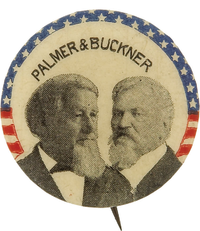Maybe this is more like 1896 and a few other elections where one part of a party broke off because it didn't like the nominee. The "Gold Democrats" or National Democratic Party didn't do at all well in the election. They did have the distinction of pairing a former Union and former Confederate general in their POTUS-VPOTUS team.

Similarly, in the 1960s Alabama and Mississippi Democrats had a habit of putting up their own slates of electors unpledged to the national parties nominees. John Anderson in 1980 has been seen as a breakaway choice of liberal and moderate Republicans, but he was more of a one man band than anything else and most of his votes came from liberal Democrats and independents.
I guess Roosevelt-Taft in 1912 might be seen as a parallel, except that this time the insurgents are more likely to get the nomination than the party stalwarts. You could also find a parallel to 1992 and 1996, except that Perot was a Trump like figure who worked outside the major parties, rather than inside one of them.
I don't really see Bernie's folks splitting from the party as a bloc. There are already enough small left-wing splinter parties that could benefit from anti-Hillary sentiment. Two questions: Is the Reform Party still around? And what are they likely to do this year if they are?